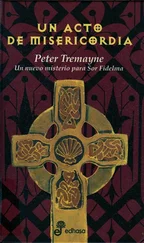Peter Tremayne - Act of Mercy
Здесь есть возможность читать онлайн «Peter Tremayne - Act of Mercy» весь текст электронной книги совершенно бесплатно (целиком полную версию без сокращений). В некоторых случаях можно слушать аудио, скачать через торрент в формате fb2 и присутствует краткое содержание. Год выпуска: 2011, Издательство: St. Martin, Жанр: Исторический детектив, на английском языке. Описание произведения, (предисловие) а так же отзывы посетителей доступны на портале библиотеки ЛибКат.
- Название:Act of Mercy
- Автор:
- Издательство:St. Martin
- Жанр:
- Год:2011
- ISBN:нет данных
- Рейтинг книги:4 / 5. Голосов: 1
-
Избранное:Добавить в избранное
- Отзывы:
-
Ваша оценка:
- 80
- 1
- 2
- 3
- 4
- 5
Act of Mercy: краткое содержание, описание и аннотация
Предлагаем к чтению аннотацию, описание, краткое содержание или предисловие (зависит от того, что написал сам автор книги «Act of Mercy»). Если вы не нашли необходимую информацию о книге — напишите в комментариях, мы постараемся отыскать её.
Act of Mercy — читать онлайн бесплатно полную книгу (весь текст) целиком
Ниже представлен текст книги, разбитый по страницам. Система сохранения места последней прочитанной страницы, позволяет с удобством читать онлайн бесплатно книгу «Act of Mercy», без необходимости каждый раз заново искать на чём Вы остановились. Поставьте закладку, и сможете в любой момент перейти на страницу, на которой закончили чтение.
Интервал:
Закладка:
‘How many do you make it, Gurvan?’ Murchad was squinting forward. ‘Twenty-five oars each side?’
‘So it seems.’
‘Oars. They give the Saxons an advantage over us …’ Murchad seemed to be thinking aloud. ‘However, I think their use of oars might mean that they are not relying on sailing skill at close quarters. Maybe that’s where we have some advantage.’
He glanced up at the mainsail.
‘Tighten the starboard halyards,’ he roared. ‘Too much slack there.’
The tighter the sail, the more speed through the water, but with the wind blowing it might lay the ship over and expose her to any contrary sea. It would also put a strain on the mainmast.
‘Captain, if the wind moderates then we’ll be helpless without oars,’ Gurvan pointed out nervously.
At that moment, Fidelma found Wenbrit beside her.
‘Aren’t you going below, lady?’ he asked anxiously. ‘The others are all below and I’ve told them to stay there. It will be dangerous here.’
Fidelma shook her head swiftly.
‘I would die below not knowing what was happening.’
‘Let’s hope that none of us die,’ muttered the boy, staring at the oncoming ship. ‘Pray God may send a strong wind.’
‘Loose the port sheets! More slack to the port halyards!’ shouted Murchad.
Sailors jumped to do his bidding and the large square mainsail swung round at an angle.
Murchad had judged the wind’s change of direction with such accuracy that almost at once the sail filled and Fidelma could feel the speed of the vessel as it suddenly accelerated over the waves.
Wenbrit pointed excitedly at the Saxon ship as the distance between the two vessels began to increase. The sail on the other ship had fallen slack. Murchad was right: the captain of the other vessel had been relying on his oarsmen and neglected to watch the wind and his sail. For several valuable moments, the Saxon lay becalmed in the water.
Even against the sibilant hiss of the sea and the whispering sound of the wind in the sail and among the rigging, Fidelma caught a faint shouting drifting over the waters.
‘What was that?’ she wondered.
Wenbrit pulled a face.
‘They call on their god of war to help them. Hear the cry? “Woden! Woden!” I have heard such roars from Saxon throats before.’
Fidelma glanced at him with a silent question.
‘The land of my people has an eastern border with the country of the West Saxons,’ he explained. ‘They were always raiding into our territory, and continually cried to Woden for help. They believe that the greatest thing that can happen to them is to die, sword in hand, and with the name of their god Woden on their lips. Then it is said that this god will carry them into some great hall of heroes where they will dwell for ever.’
Wenbrit turned and spat across the railing into the sea to show his disgust.
‘Not all Saxons are like that,’ Fidelma protested as the image of Eadulf suddenly came into her mind. ‘Most of them are Christian now.’
‘Not those in that ship,’ Wenbrit corrected with a cynical expression.
The other vessel had eased into the wind now; its oars had been withdrawn and the sail was filling. Now Fidelma could see the great lightning flash on the sail. Wenbrit saw her narrowing her eyes as she focused on it.
‘They have another god called Thunor who wields a great hammer. When he strikes with it, thunder is caused and the sparks that fly are the lightning,’ he informed her solemnly. ‘They even have one weekday sacred to that god called Thunor’s day. It is the day we Christians called Dies Jovis.’
Fidelma refrained from telling the boy that the Latin name was merely that of another ancient pagan god, but this time of Rome. It was a pointless piece of pedantry now. But she had heard of Thunor from her long talks with Brother Eadulf concerning the ancient beliefs of his people. She found it hard to believe that there were still Saxons who believed in the old gods after two centuries of contact with the Christian Britons and the Irish missionaries who had converted the northern kingdoms from their wild superstitions founded on war and bloodlust. She continued to keep watching the Saxon ship as it began to overhaul them once again.
‘He’s using the wind now, Captain,’ she heard Gurvan call. ‘She seems a fast ship and her captain knows how to sail her with the wind behind him.’
It was an understatement. Even Fidelma could see that the approaching vessel was faster in the water than The Barnacle Goose . After all, the attacking ship was built for war and not, like Murchad’s ship, for peaceful trade.
Murchad kept glancing at the sails and then at the oncoming craft. He swore. It was an oath such as Fidelma had never heard before; a full savoured seaman’s oath.
‘At this rate, she’ll be on us in no time. She’s smaller and faster, and what’s more she’s weathering on us.’
Fidelma wished she understood the terms. Wenbrit saw her frustration.
‘The direction of the wind, Sister,’ he explained. ‘Not only is the wind causing the Saxon to overhaul us but, because of the angle we are at in position to the wind, we are being pushed towards the Saxon’s course. In other words, we are drifting on to the Saxon’s course and cannot maintain any parallel distance from her.’
A feeling of apprehension went through her.
‘Is the Saxon going to overtake us then?’
Wenbrit gave her a reassuring grin.
‘Her captain made a mistake before; perhaps he will make another mistake. It will take a good seaman to outsail Murchad. He lives up to his name.’
And Fidelma recalled that the name Murchad meant ‘sea battler’.
At this moment, the captain was pacing up and down, thumping his balled fist into the palm of his other hand, his brows drawn together as if working out a problem.
‘Bring her into the wind!’ he shouted abruptly.
Gurvan looked startled for a second and then he and his companion leaved on the steering oar.
The Barnacle Goose swung around. Fidelma stumbled and grabbed for the rail. For a few moments the great ship seemed becalmed and then Murchad shouted another order to tack.
Caught up in the sudden change of tactic by Murchad, Fidelma took a few moments to look around for the Saxon ship.
So confident had the opposing captain been of overhauling this prey and coming alongside, that it had taken him several precious moments to realise what Murchad was about. The lightly-built Saxon warship had gone speeding by under full sail with the wind right behind it. It had sped on for almost a mile before the sails were shortened and the craft had come about to follow the new path of The Barnacle Goose .
‘A good manoeuvre,’ Fidelma said to Wenbrit. ‘But aren’t we pushing against the wind now? Won’t the Saxon be able to catch up with us?’
Wenbrit smiled, and pointed up at the sky.
‘We might have to sail against the wind, but so does the Saxon. Look at the sun on the horizon. The Saxon will not catch up before nightfall. I think that Murchad plans to slip past her in the darkness, provided those clouds remain and there is no moon.’
‘I don’t understand.’
‘With the wind behind our sails, the Saxon, being lighter and therefore faster, had the advantage of speed. We were heavy and more cumbersome. When we come into the wind, it’s a different matter. The waves that impede our progress also hinder the progress of the Saxon … but even more so. Whereas we can ride the heavy seas, the contrary waves will push their lighter craft farther to the leeward, and they will have more work to do to catch up with us.’
Murchad had overheard the boy’s explanation; he now came over to them with a broad grin. He seemed pleased with his seamanship and more relaxed now that the Saxon ship was struggling behind them.
Читать дальшеИнтервал:
Закладка:
Похожие книги на «Act of Mercy»
Представляем Вашему вниманию похожие книги на «Act of Mercy» списком для выбора. Мы отобрали схожую по названию и смыслу литературу в надежде предоставить читателям больше вариантов отыскать новые, интересные, ещё непрочитанные произведения.
Обсуждение, отзывы о книге «Act of Mercy» и просто собственные мнения читателей. Оставьте ваши комментарии, напишите, что Вы думаете о произведении, его смысле или главных героях. Укажите что конкретно понравилось, а что нет, и почему Вы так считаете.











